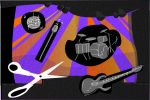Playing in a band is one of the most rewarding experiences you can have in college, if it is your desire to start and/or join one. Generally, people are innately welcoming to live music, and in an environment surrounded by like-minded peers perpetually searching for new forms of entertainment, finding opportunities to flex your musicianship can feel as easy as shooting fish in a barrel.
As utopian as the lifestyle can appear at first glance, committing to it in any degree forces you to walk fine lines in numerous directions. In many ways, playing music in an undergraduate setting could mean putting your entire interpersonal life at stake. Here are a few lessons I’ve picked up about the main issues that come with playing in a band in college.
1. Your Bandmates Are Individuals and Think as Such
Essential to manufacturing a cohesive sound you can feel proud of, your bandmates will prove your greatest assets and most significant adversaries. Together, you have the power to form a creative conglomerate that brings joy and good vibes to an innumerable swaths of people. Perpetually, a group of people will be there to share in your accomplishments and positive experiences. Often, these experiences come accompanied by a type of honeymoon period.
If you’re still getting to know each other, odds are a level of civility will establish itself between everyone in the band in an attempt to build camaraderie and invite open and positive discussion about all creative and professional decisions. This period does not last forever.
Like it or not, your bandmates’ aspirations for the band may not align perfectly with your own. While this does not need to mean a death sentence for the band — in fact, actively working through these differences in opinion will only make you closer as friends and tighter as musicians — it presents challenges that must be confronted.
At these junctures, your responsibility is to first ask yourself exactly what you want out of the project. Has that answer changed since the band started? Does it appear irreconcilable when compared to that of your peers? Which do you value more: the musical endeavors of the band or your relationship with your bandmates?
There are no right answers to these questions, beside the ones that you truly believe are most fitting for you. Communicate these to your bandmates and listen attentively to your bandmates’ respective answers. Before you even realize it, your relationship with your fellow musicians could very well have developed into something incredibly intimate.
After all, by writing music with these people, you are expressing a level of vulnerability to them that you do not grant to anyone else. Think carefully before you speak, and take everything with a grain of salt.
2. There Is Such a Thing as Playing Too Much
Paradoxically, something that has killed the momentum of so many bands is overplaying an area. No matter how big of a city you live in, at some point — sooner than you think — people will tire of seeing the same band play the same places.
For the first few months of performing, it makes sense to take as many local opportunities as come your way so as to build a relationship with local bands, promoters and supporters.
Once you’ve amassed some form of a following, it’s time to sparse out when and where you play. One big local show every eight weeks is preferable to four where perhaps a couple people will come out. Better to leave your audience wanting more than to have them get sick of you.
3. Some Biases are Unavoidable, but Accurate
An often made-fun-of archetype today is the “band dude.” Typical description: skinny, white, overly self-assured male in his late teens to early 20s, adorned in a black knit hat. To be fair, this description makes up about 20 percent of the musicians I know personally — including myself — to a terrifying degree.
From its inception, the indie music scene has been oversaturated by white men performing, booking, attending and promoting local music scenes. Countless reasons go into why the scene’s in this state of disarray, but the best insight I can offer you is how to accept and work around this challenge.
A totally uncontrollable way to combat this issue is to not be a straight, cis, white man. If this describes you, thank you for contributing to your local DIY scene. You have an incredibly powerful role in DIY music right now, and I wish you nothing but support and a PA through which your voice can be heard.
If you fit more into the above “band dude” definition, that does not mean that you are innately a bad person. Loving music and wanting to share that is a beautiful thing that can bring light and color into an otherwise bleak landscape. It’s your responsibility to be aware of your own privilege, and try to make your scene feel as inclusive to everyone as possible.
Just a few of the ways you could help accomplish this would be: prior to booking shows, maintain awareness of female, LGBTQ+ and POC musicians in your area to get on bills and promote releases; unify against any figure who threatens the safety or respect of women, POCs and/or LGBTQ+ members of your scene; host or attend events in support of causes trying to help your underprivileged friends in the area.
To contribute to making a difference in this climate, you must walk a fine line. Checking a few moral boxes and wiping your hands clean of your sense of social obligation is not going to help anyone. This fight is not going to end soon, and the change being made is not as simple as flipping a switch.
Keep an open mind and learn from your mistakes. You owe it to yourself and every member of your local music scene.
















